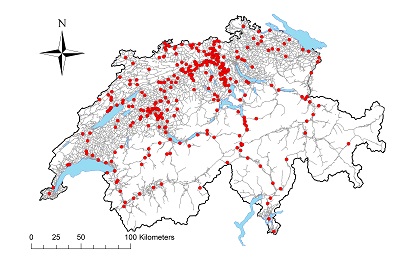
Travel demand models constitute a keystone of the economic evaluation of transport projects, facilitating in turn an informed decision making process. In the last decades, travel modelling has evolved along the lines of utilizing more disaggregate data, resulting to computationally cumbersome and conceptually complex models. However, it remains unclear to what extent such models have improved the quality of the evaluation process.
Driven by this, the focus of ongoing research at IVT is centered on developing an alternative simplified modelling methodology as a form of a direct demand model, where only aggregate data is needed. The model should be able to make statements about the traffic volume and speed for any location in a network, as these items are required at minimum for cost-benefit analysis (CBA).
Using as a benchmark the traditional econometric modelling tools, two hypotheses are thoroughly tested. At first, that the spatial structure of network matters and hence ways to incorporate it into the modelling formulation should be sought. Secondly, omitting to account for the well-known interdependence between volume and speed can give rise to systematic biases. On the basis of these two hypotheses, a system of two simultaneously estimated spatial regression models is developed, making use of independent variables related to the socio-economic and network characteristics.
The National Street Network of Switzerland as a Test Field
The national street network of Switzerland (see image) is employed as a test field for the estimation of the models while a set of currently discussed transport investments and policies will be used as test cases. The quality loss will be measured by the choices, i.e. their costs and benefits potentially foregone or committed as measured with the official Swiss CBA, against those choices as supported by the existing calibrated National Personal Transport Model and the existing agent-based MATSim implementation.
The estimates will quantify the trade-offs between the chosen model formulation and the completeness of the benefits accounted for. Furthermore, the findings can also provide valuable insights on how spatial regression models can benefit existing transport modelling approaches, advancing them in a different methodological way than the prevailing one of incorporating more behavioral complexity.
Georgios Sarlas is scientific assistant at the Transport Planning research group within the Institute for Transport Planning and Systems (IVT). His main field of research is travel demand modelling.
Image: The employed street network with the count locations